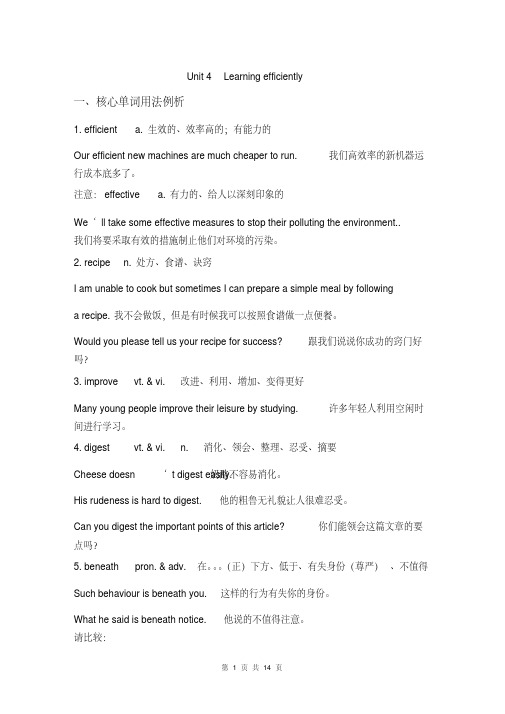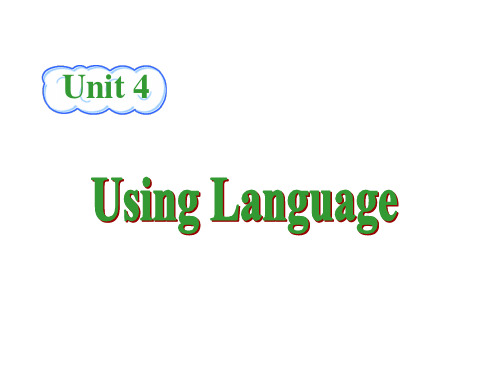选修10课本全套资料—unit4
高二英语人教版选修十课件:unit+4+代词+Word版含解析

的同一事物,te is too cold. I don’t like it. The weather in Beijing is colder than that in Guangdong. My uncle bought me a dictionary and I like it very much. Your dictionary is more useful than the one my uncle gave me. ---Who is her husband? ---The one by the window.
none, nothing, no one的区别: none 可以和of 连用,其它的不能和of连用; none 与all 反义
none: 既可指人,也可指物,它只是指在一定 范围内,代替上下文已出现过的名词。 nothing: 表示“没有什么东西”,只能指物, 不能指人,同时没有任何限制。 no one: 一般用来指人,使用时不受一定范围 的限制,后面一般不接引导的介词短语.
四、替代特指的名词复数,用the ones •I’d like to try on the shoes there. The ones at the front of the window. •Are they the ones who moved here recently? 注意:口语中常用those来替换the ones,尤其当 面有of短语或who引导的定语从句修饰时 His ideas are different from those of his friends.
人教版高中英语选修10 Unit 4《Learning efficiently》(第1课时)ppt课件

K课前学习 EQIAN XUEXI
K 课堂深入 ETANG SHENRU
12 3 4 5 6 7 8
④What advantages do you think will enable you to be competent at the position in the future?
你认为你有哪些有利的条件来胜任将来的职位? 短语:be competent at sth 意义:在……方面有能力
有某些技巧可供你学习,然后就要靠你自己去练习、练习、再练习。
考点:up to sb 取决于某人,在于……
①It’s up to him to decide. 这由他来决定。
考点延伸阅读下列句子,指出 up to 的其他意义
②What have you been up to lately? 你最近在忙什么? 意义:忙于 ③The manager is well up to his work. 经理十分胜任他的工作。 意义:有某种能力的,胜任
j.to judge the quality or worth of,to evaluate
答案:1.d 2.f 3.a 4.c 5.j 6.e 7.b 8.i 9.h 10.g
一二三四
K课前学习 EQIAN XUEXI
K课堂深入 ETANG SHENRU
二、英汉互译
1.apply to 2.查询,查阅 3.slow down 4.详细地 5.以及,又,也 答案:1.适用于 2.look up
2)阅读下列句子,指出黑体词的词性和含义
⑤No one doubts her competence as a teacher. 谁也不怀疑她能胜任教师工作。 词性:名词 含义:能力;胜任;本领
人教新课标选修10Unit4Learningefficiently词汇句型语法讲解

Unit 4 Learning efficiently一、核心单词用法例析1. efficient a. 生效的、效率高的;有能力的Our efficient new machines are much cheaper to run.我们高效率的新机器运行成本底多了。
注意:effective a. 有力的、给人以深刻印象的We‘ll take some effective measures to stop their polluting the environment..我们将要采取有效的措施制止他们对环境的污染。
2. recipe n. 处方、食谱、诀窍I am unable to cook but sometimes I can prepare a simple meal by followinga recipe.我不会做饭,但是有时候我可以按照食谱做一点便餐。
Would you please tell us your recipe for success?跟我们说说你成功的窍门好吗?3. improve vt. & vi. 改进、利用、增加、变得更好Many young people improve their leisure by studying.许多年轻人利用空闲时间进行学习。
4. digest vt. & vi. n. 消化、领会、整理、忍受、摘要奶酪不容易消化。
Cheese doesn‘t digest easily.His rudeness is hard to digest.他的粗鲁无礼貌让人很难忍受。
Can you digest the important points of this article?你们能领会这篇文章的要点吗?5. beneath pron. & adv. 在。
(正)下方、低于、有失身份(尊严)、不值得Such behaviour is beneath you.这样的行为有失你的身份。
新人教版高中英语选修十课件Unit 4Learning efficiently-Listening

3. Taking notes.
•Say what you are going to talk about, say it and then summarize what you said. •Write topics on the board. •Use visuals if possible •Hand out examples after the speech so audience are not distracted.
Байду номын сангаас
8). Imagine what it would be like if we __h_a_d_ wings. (have)
9). She suggested that we all s_h_o_u_l_d_h_a_v_e_ a good night’s sleep before the exam. (have)
Module 10 Unit 4
Listening on P75
1. Discuss these questions briefly with others in your group.
1). What makes a good talk? Prepare a talk by listing the things to be talked about. When you present your talk, first tell your audience what you're going to talk about. Then say it. Finally, sum up what you’ve said.
2). What things should you NOT do when giving a talk? You should not write down every thing you want to say and read it aloud to your audience.
人教版高中英语选修10Unit4知识点汇总

人教版高中英语选修十Unit 4知识点总结Unit 4 Learning efficiently1. efficient/ ɪˈfɪʃnt /adj.有效率的;效率高的2. efficiently/ ɪ'fɪʃntlɪ /adv. 有效率地;效率高地3. centigrade/ ˈsentɪgreɪd /adj.摄氏温度的4. diameter/ daɪˈæmɪtə(r) /n.直径5. recipe/ ˈresəpi /n.菜谱6. booklet/ ˈbʊklət /n.小册子Would you read the instruction booklet from beginning to end.你会从头到尾阅读说明手册吗?7. endeavour/ ɪn'devə(r) / n.尽力;竭力vi.&vt. 努力; 竭力Most people agree that the best way to improve your skills in any endeavour is to practise, practise and then practise some more. 大多数人认为努力改进技能的最佳方式就是实践、实践、再实践。
8. competent/ ˈkɒmpɪtənt /adj.有能力的;能胜任的(反义词incompetent)The same principle applies to competent readers. 上述原则同样适用于能力强的读者。
9. up to... 取决于……There are certain techniques you can learn and then it is up to you to practise, practise and practise. 有某些技巧可供你学习,然后全靠你自己去练习、练习、再练习了。
人教版高中英语选修10课件:Unit4 Using Language(共43张PPT)

A: I know that. I’m just using the tapes to help me PRACTISE my reading. You see, I find it easier to learn when I’m listening. But once I can read easily, I’ll stop using the tapes.
A Survey of your learning styles
1. When you have a list of new words to learn for English, how do you do about learning them?
2. What do you think is the best way to learn grammar rules?
Y: I’ve thought of something you could do about that.
texts in the course book are recorded? X: Yeah. A: I listen to the tape while I’m reading. Y: But isn’t that cheating?
A: No, of course not. I still do all the reading comprehension questions on my own. I just have extra help with the reading.
新人教版高中英语选修十 Unit 4 Reading教学课件
What’s your way of reading it?
•Start from the very beginning •Start by looking at the headings •Start by looking at the illustrated pictures •Read it as quickly as I can •Read it slowly so that I can get every details
headings , looking at any pictures or diagrams, reading the conclusion or introduction? Why do you read in the way you do? Most competent readers survey a text before they read in detail to see what it is about or whether it is useful, interesting, etc.
Efficient readers are those who keep the purpose for reading in mind and focus on those part of the text that help them to achieve that purpose. It is important for us to understand this, because many think that all texts in their English class must be read slowly and purposely and that every part of it must be thoroughly understood.
人教版高中英语选修10 Unit 4 Learning effectively Reading 课件
A.award
B. prize D
C. reward
D. bonus
bonus 红利;奖金;额外津贴;意外收获
9. He’s watching TV? He’s ___ to be cleaning
his room. B
A.known B. supposed
C. regarded D. considered
you read things you are interested in or that you find useful.
3 The key to success in reading is frequent practice plus good reading techniques.
Before you start reading a text in detail
A. guessing
B. assessBing
C. valuing
D. praising
5. In order to sell my house since I have found a job in another city, I sent for an official on
house property to make an __B__ of it.
4.Summary
Task2: Second Reading
Ex2: Read the text again and summarize it in 3 sentences and then make a poster advising students how to improve their reading skills.
work hard at hCis lessons.
人教版高中英语选修10课件:Unit4 Workbook(共27张PPT)
Make notes to remind you of what to say.
Talking --- Giving a Talk
Now it’s your turn to prepare a twominute talk abut something your are interested in. It could be a hobby or sport, a book or film, a career you hope to follow when you leave school or a country you know a lot about.
Using Structures:
1. Complete the sentences with the verbs in brackets in
appropriate form of the subjunctive mood. 1. We should act as though he _w_e_r_e_w__a_tc_h_i_n_g_ us.
Listening
1. Discuss these questions briefly with others
in your group.
1 What makes a good talk? 2 What things should you NOT do when giving a talk??
人教版高中英语配套课件选修10unit4period1
课前自主学习
课堂互动探究
Ⅱ.短语天地 1.up to sb to do sth______________ 2.get frustrated______________ 3.make comments on______________ 4.consult reference books______________ 5.在度假______________ 6.从头到尾______________ 7.……也一样______________ 8.舀出______________
( 答案
课前自主学习
课堂互动探究
Unit 4 Learning efficiently Period 1 Warming Up, Prereading & Reading课件(人教版选修10,课标通用)
Ⅰ.单词识记 1.________/I'fIʃnt/ adj.有效率的;效率高的→________ n. 2.________/'sentIgreId/ adj.摄氏温度的 3.________/daI'æmItə/ n.直径 4.________/'resIpI/ n.菜谱 5.______/'kɔmpItənt/ adj.有能力的;能胜任的→______ n. 6.adopt/ə'dɔpt/ vt.________→________ n.收养;采用 7.preview/'prIːvjuː/vt. ________→________vt.(反义词)
课前自主学习
课堂互动探究
Yet despite that , reading is increasingly unpopular among to statistics,in 1997,23% said they didn't like reading at 2003,35% around 6% of children leave primary school each year unable to read properly.
- 1、下载文档前请自行甄别文档内容的完整性,平台不提供额外的编辑、内容补充、找答案等附加服务。
- 2、"仅部分预览"的文档,不可在线预览部分如存在完整性等问题,可反馈申请退款(可完整预览的文档不适用该条件!)。
- 3、如文档侵犯您的权益,请联系客服反馈,我们会尽快为您处理(人工客服工作时间:9:00-18:30)。
Unit 4 Learning efficiently一、核心单词用法例析1. efficient a. 生效的、效率高的;有能力的Our efficient new machines are much cheaper to run.我们高效率的新机器运行成本底多了。
注意:effective a. 有力的、给人以深刻印象的We‘ll take some effective measures to stop their polluting the environment..我们将要采取有效的措施制止他们对环境的污染。
2. recipe n. 处方、食谱、诀窍I am unable to cook but sometimes I can prepare a simple meal by followinga recipe.我不会做饭,但是有时候我可以按照食谱做一点便餐。
Would you please tell us your recipe for success?跟我们说说你成功的窍门好吗?3. improve vt. & vi. 改进、利用、增加、变得更好Many young people improve their leisure by studying.许多年轻人利用空闲时间进行学习。
4. digest vt. & vi. n. 消化、领会、整理、忍受、摘要Cheese doesn‘t digest easily.奶酪不容易消化。
His rudeness is hard to digest.他的粗鲁无礼貌让人很难忍受。
Can you digest the important points of this article?你们能领会这篇文章的要点吗?5. beneath pron. & adv. 在。
(正)下方、低于、有失身份(尊严)、不值得Such behaviour is beneath you.这样的行为有失你的身份。
What he said is beneath notice.他说的不值得注意。
请比较:Our income is below average.我们的收入在平均水平以下。
The boy sitting under the electric fan is the best in our class.坐在电风扇下的男孩是我们班上最好的学生。
It‘s beneath us to quarrel with such a mean fellow.和这样卑鄙的家伙争吵有失我们的身份。
6. adopt vt. 采纳、收养The committee adopted my suggestions.委员会采纳了我的建议。
His wife has not borne him any child so they decided to adopt a boy.他妻子到现在都没有生孩子,所以他们决定领养一个男孩。
注:adapt是―适应、改写‖的意思。
比如:We should adapt ourselves to the new conditions.我们要使自己适应新的形势。
This play is adapted from a novel.这个剧本是由小说改编的。
7. assess vt. 对。
进行评估、征收税款They are assessing his house.他们在对他的房屋进行评估。
I‘m assessed at 500 yuan a month for the salaries.我每个月被征收500元的工资税。
8.acute adj. 尖锐的、敏锐的、剧烈的、急性的Many of the animals have an acute sense of smell许多动物有敏锐的嗅觉。
The girl is in acute pain.那个小女孩感到剧痛。
9. bent adj. & n. 弯的、不正直的、决心的、爱好He is a bent copper; he isn‘t straight.他是一个不正直的警察。
My son has a bent for painting.我儿子爱好绘画。
10. tend vt. & vi. 照管、护理、招待;走向、趋势、倾向、有助于She tended her husband lovingly during his long illness.在她丈夫长期生病的过程中,她非常精心地照顾了他。
Interest rates are tending upwards.利息在上涨。
We tend to be optimistic.我们倾向于乐观。
注意:intend to do sth是―打算、想要‖意思。
比如:I‘ve made a mistake, though I didn‘t intend to.我犯了一个错误,尽管我不想(犯错误)。
11. tiresome adj. 使人疲劳的、令人厌倦的This is a tiresome piece of work.这是一件累人的事。
12. concrete adj. n. vt. & vi. 具体的、混凝土(制的)、使凝固、固结We must make a concrete analysis of concrete problems.我们必须对具体问题作具体分析。
The workman is still busy concreting the road.工人们还在给路面浇注水泥。
13. consult vi.& vt. n. 磋商、会诊、查阅、考虑、Have you consulted your doctor about your illness你找过医生给你诊断过你的病吗?I was once consulting for a large building firm.我曾经在一家大的建筑公司做顾问。
Consulting the students‘ conveni ence to and from school, the local government built a bridge over the river.考虑到学生们上学来回的方便,当地政府在这河上架起了一座桥。
二、高三选修10 Unit 4 Learning efficiently词组句型解析1. in detail 详细地Will you explain it to us in detail?请你给我们详细地解释一下这件事吧。
2. think about 考虑、回想、想起We are thinking about inviting a professor from Beijing University to giveus a lecture.我们正在考虑从北京大学请一位教授来给我们做报告。
3. at the beginning 在开始时刻/地点Do you start at the beginning and continue reading to the end or do you other things first…?你是从文章开头(的地方)开始然后继续读到结尾,还是先做其他的事,比如。
?请比较:In the beginning of the class, the teacher asked us some questions.在刚开始上课时(刚开始那一段时间内),老师问了我们一些问题。
4. agree with 同意、和。
一致、适应I agree with you/ your opinion/ your idea.The soup/ weather doesn‘t agree with me.注意:agree on 是―双方或几方面就某一件事达成统一的意见或协议‖意思;agree to是―一方不得不同意或接受另一方意见等‖意思。
比如:They agreed on the price of the car.他们就小车的价格达成了一致(的意见)。
He agreed to his wife on buying a new flat.他只好同意他妻子的意见买一套新公寓。
5. would like to do 想要做某事(也有说:should like to do)I‘d like to hear what you will tell me.我想听一听你能告诉我什么。
6. look forward to doing 期待、盼望。
(常用进行时态)We are looking forward to your reply.我们期盼着你的答复。
注意:The boy is looking forward to see clearly whether it‘s a snake or a rope.那孩子倾身向前想要看个究竟,这到底是一条蛇还是一根绳索?7. find out (通过调查研究)得知、发现I won‘t tell you; you must find out for yourself.我不会告诉你的;你要自己去找。
8. such as 像。
这种的、诸如。
之类的、例如Such girls as he knew were teachers.像他所认识的这些女孩是老师。
Books of reference, such as dictionaries and handbooks, sell well nowadays.参考书,比如词典、手册之类的,现在很畅销。
9. the same (…) as… 和。
一样The 2 brothers look the same as each other.那兄弟俩长得一模一样。
注意:也有the same… that…结构,但是两者的意思有区别。
比如:Tom is wearing the same coat that his father did last winter. 汤姆穿着他爸爸去年冬天穿过的袄子。
(同一件)10. apply to应用于。
、向。
提出。
We should apply the theory to practice.我们要把理论应用于实际。
I‘m applying myself to compiling this handbook during these days.最近我在致力于这本手册的编写。
11. up to… 从事于、胜任、轮到、该由、直到What are you up to here?你在这里要干什么?I‘m not up to this job.我不能胜任这项工作。
It‘s up to you to decide when we shall start. 何时动身由你决定。
